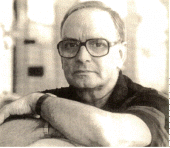A classmate of director Sergio Leone with whom he would form one of the great director/composer partnerships (right up there with Eisenstein & Prokofiev, Hitchcock & Herrmann, Fellini & Rota), Ennio Morricone studied at Rome's Santa Cecilia Conservatory, where he specialised in trumpet. His first film scores were relatively undistinguished, but he was hired by Leone for Per un pugno di dollari (1964) on the strength of some of his song arrangements. His score for that film, with its sparse arrangements, unorthodox instrumentation (bells, electric guitars, harmonicas, the distinctive twang of the jew's harp) and memorable tunes, revolutionised the way music would be used in Westerns, and it is hard to think of a post-Morricone Western score that doesn't in some way reflect his influence. Although his name will always be synonymous with the spaghetti Western, Morricone has also contributed to a huge range of other film genres: comedies, dramas, thrillers, horror films, romances, art movies, exploitation movies -making him one of the film world's most versatile artists. He has written nearly 400 film scores, so a brief summary is impossible, but his most memorable work includes the Leone films, Gillo Pontecorvos Battaglia di Algeri, La (1965), Roland Joffé's The Mission (1986), Brian De Palma's The Untouchables (1987) and Giuseppe Tornatore's _Nuovo cinema Paradiso (1988)_ , plus a rare example of sung opening credits for Pier Paolo Pasolini's Uccellacci e uccellini (1966). It must be stressed that he is *not* behind the work of the entirely separate composers Bruno Nicolai and Nicola Piovani despite allegations made by more than one supposedly reputable film guide!
